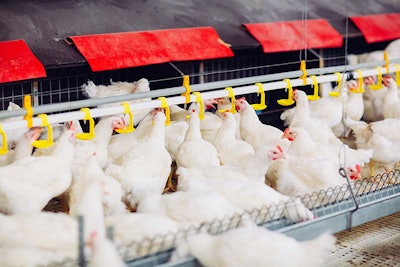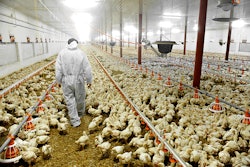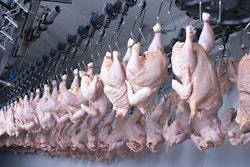
Insect farming could be a practical, economical and sustainable approach to create an alternative high-value protein produced for use in poultry feed. Insect proteins also offer immunity improvements in poultry and livestock, supporting health and reducing the need for antibiotics.
In the wild, poultry will naturally eat insects, considered to be a protein-rich food source high in energy such as lauric acid, a C-12 saturated fatty acid with demonstrated value-added, antimicrobial and antibacterial properties. The short lifecycles of insects – typically less than 50 days – and ability to thrive on a variety of feedstocks make it an easy protein source to produce.
Researchers are now looking at ways to convert insect protein into a component of poultry diets. The use of insects to bioconvert by-products from other food production, like food waste, manure and other agricultural waste streams, could potentially minimize waste and upcycle nutrients, improving the sustainability of the poultry supply chain.
In addition, insects can be bred in significant numbers in large-scale factory conditions that require a smaller environmental footprint than soybean meal and fishmeal with reduced land and water use and waste and pollution emissions. Insect protein production occurs in a circular system, helping to close water, nutrient and carbon cycles.

Insects can provide enrichment benefits too
New research from Wageningen University and Research (WUR) in The Netherlands indicates that insect protein can provide more than dietary benefits for poultry. It can also serve as a form of enrichment to improve the welfare of broilers.
“I want people to know the potential of black soldier fly larvae mainly to facilitate natural behavior, but also potentially to improve leg health. Effects are largest if you can prolong the time broilers have access to the larvae, such as by providing larvae in tubes, or by regularly distributing small amounts of larvae,” WUR researcher Allyson Ipema said.
In two recently published studies, the researchers provided black soldier fly larvae to broilers by either scattering it across the bedding in the pen or placing it in transparent tubes that required pushing or pecking to get the larvae out. The broilers received the larvae between four and seven times a day at the equivalent of 5% or 10% of birds’ daily dry matter intake, depending on the study.
The results showed that access to black soldier fly larvae encouraged the natural behavior of foraging, made the birds more active and, in some cases, led to better leg health
“While we now know what live larvae can do, it may be possible that these benefits could also be achieved with other insect species, or other processed insects such as dried insects, which may make it more relevant,” said Ipema.
In 2022, Ipema plans to study the use of other types of larvae, such as dried or popped, as broiler enrichment.
“Much research is still needed to determine how black soldier fly larvae can benefit poultry, mainly under true commercial conditions and involving different types of larvae. However, we have clearly shown the potential of using insect larvae to improve broiler welfare, and we hope that insects will become more common in animal diets in the future,” she added.
Research center to advance insect farming
Scientists from Texas A&M University, Mississippi State University and Indiana University-Purdue University, Indianapolis (UIPUI) have established the Center for Environmental Sustainability through Insect Farming to focus on finding solutions for sustainable insect protein production – both for human feed production and as feed for poultry, livestock and aquaculture.
“As omnivores, chickens naturally forage and eat insects,” Cheryl Preyer, chief liason officer at the center said. “Many insects can be grown on by-products of food production and, in essence, upcycle nutrients that might otherwise be wasted and bring them back into the food chain.”
The goal of the center is to bridge academia with industry to explore the safe and effective use of insect protein. One of the largest challenges the Center plans to tackle is figuring out how to produce insects at the volume needed for the poultry industry.
“Insect production for feed and food is a young industry. As such, production is limited and pricing is at a premium. As production grows, price is likely to adjust. Research can help build understanding of the optimal inclusion rates for insects in poultry diets,” Preyer said.
The Center is funded through a $2.2 million grant from the National Science Foundation. More than 34 U.S. and global companies, including Tyson Foods and Mars Inc., serve as industrial partners for the center.
“Its mission is to respond to industry needs and provide a map of how to navigate into the future and grow efficiently, effectively and sustainably,” Jeff Tomberlin of the Department of Entomology at Texas A&M University and a researcher with the center, said.
“We’re focused on all aspects of insects as food and feed – directly through human consumption or indirectly through livestock consumption.”
The Texas A&M scientists will focus on optimizing the production and development of insects as feed for humans and animals. IUPUI will target genetics, while Mississippi State University will concentrate on quality assurances related to microbiology.
Research focuses on sustainability of insects as poultry feed www.WATTAgNet.com/articles/43470


















